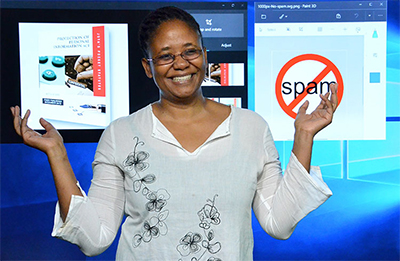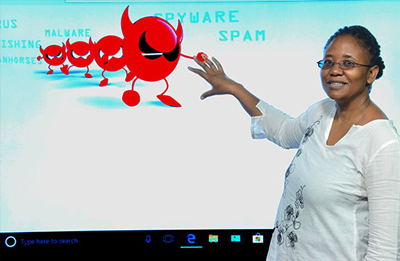

Unisa’s Dr Sebo Tladi is the first black South African to earn a PhD in Electronic Communications Law.
From a very early age Unisa’s Dr Sebo Tladi knew that she wanted to wear the coveted red gown that distinguishes a person who has achieved their PhD. Today, she’s not only an outstanding academic but the first black South African to earn a PhD in Electronic Communications Law.
“Attaining a PhD regardless of the field of study is a milestone and indeed a lot of hard work and agonising over the fact that one would eventually finish is part of that process. This achievement brings about great responsibility, in that one has now an obligation to impart the knowledge and the skills obtained in order to empower one’s community,” said the academic from Unisa’s Department of Mercantile Law.
Interestingly enough, her field of research was not in existence at the time that she dreamt of her future academic achievements. “But I told my mother even then that I would not stop studying until I wore the red gown,” Tladi said with a determined smile.
Her research is of particular importance since we now live in a more connected world with many parameters and issues entering the legal space. Some of themes Tladi touches on include e-contracts, e-payments, cyber security, and cyber crime. But it’s mostly focused on something that everyone dreads seeing in the inbox, unsolicited electronic communication or spam.
The title of her thesis is The regulation of unsolicited electronic communications (spam) in South Africa: A comparative study. As spam affects a number of stakeholders, the thesis focuses mainly on consumers as end users because they are targeted for marketing purposes and they are the last to know how to deal with such.
Since spam is disseminated via electronic communications including e-mail and text messaging, the thesis only focuses on e-mail spam. The question asked in the thesis is whether the South African fragmented system in regulating spam is adequate in protecting consumers. The investigation looked at the international best practices in curbing spam through a comparative study on international and regional initiatives and the effectiveness of anti-spam laws adopted in a number of jurisdictions.

The title of Tladi’s thesis is The regulation of unsolicited electronic communications (spam) in South Africa: A comparative study. As spam affects a number of stakeholders, the thesis focuses mainly on consumers as end users because they are mostly targeted for marketing purposes and they are the last to know how to deal with such.
The title of Tladi’s thesis is The regulation of unsolicited electronic communications (spam) in South Africa: A comparative study. As spam affects a number of stakeholders, the thesis focuses mainly on consumers as end users because they are mostly targeted for marketing purposes and they are the last to know how to deal with such.
The recommendation proposed in the thesis is that a multi-faceted approach be implemented in order for South Africa to provide adequate protection for its consumers. This approach will start at a local level with the harmonisation of the current fragmented laws by introducing an anti-spam law with an opt-in regime as a default mechanism. In addition to the Model Law, the implementation of consumer education initiatives, industry initiatives, and technical measures should also be considered. “In combating spam at a global level, South Africa should consider entering into partnerships with relevant stakeholders in order to curb spam at that level,” she said.
Tladi has received numerous plaudits for her thesis which many believe can greatly assist with ICT laws. “Education or consumer advocacy is vital at all levels. The vulnerable in our society, namely the elderly or otherwise referred to as the ‘born before technology’, children, and the youth need to be protected. Government should play a role in making sure that the curriculum is tailor made to expose learners at grade school on how technology works and also the impact it has on the law,” she urged.
Tladi explained that she is mostly excited about the benefits that this research will have on consumers. “The majority of the citizens are consumers and they possess either smartphones, iPads, PCs, or notebooks, which means they have been exposed to spam and direct marketing advances, to name a few. The research not only outlines the problems that spam causes and how consumers personal information is gathered by senders for spam purposes, it also highlights practical ways in which consumers can protect themselves from the scourge. It alerts consumers on how to safeguard their personal information when surfing the Internet, by not signing up for free newsletters, or exchanging their personal information for freebies. The adage ‘if it’s free then you are the product’ applies in this instance,” she said.
She highlighted that the research would equip consumers in knowing the different kinds of scams and that not all marketing and advertising is for their own good. One of the many practical aspects advanced in the thesis that all can apply even now is that one should delete and not reply to e-mails that market products or promise an inheritance of some sorts. By replying to such e-mails one is merely saying to the sender that they are ‘alive’ and they will receive more spam e-mails from other senders. “Remember, that there are databases out there containing personal information of millions of people, and spammers are also in the business of selling and harvesting such lists. The same applies to SMSes where one needs to pay a tariff for opting out, even though the law prohibits such. In short, the research will assist consumers to be savvy and cautious when using electronic communications.”
Reflecting on her achievements and finally getting her coveted PhD, Tladi is reflective on her journey and how it’s shaped her personally and professionally. Having juggled numerous roles as an academic, mother, wife, daughter, and friend, she’s got some words of wisdom for those who also want to wear the red gown one day. “Whatever you do in life, do it with your whole heart. Always keep your mind set on achieving whatever you want to do. It doesn’t matter who finishes first; what matters is that you finish what you have started. If you fall, have the sense to stand up, dust yourself off, and move on,” Tladi advised.
*By Kirosha Naicker
Publish date: 2017-11-29 00:00:00.0